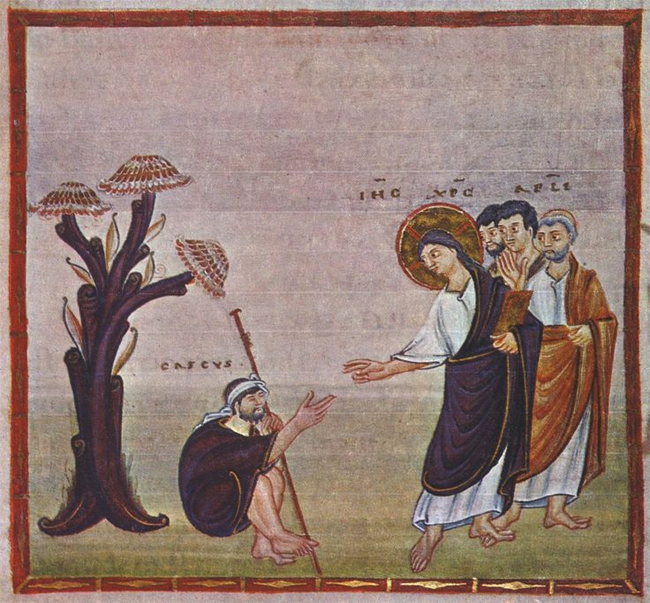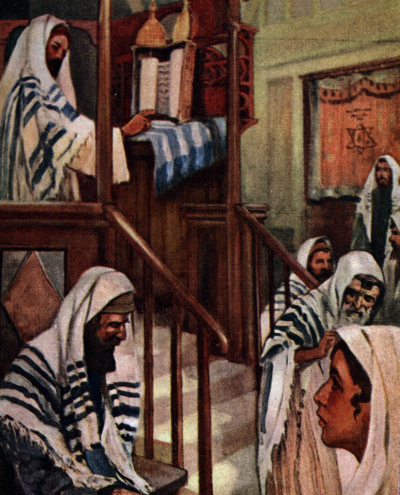Christian Art | Jesus, Scribes, Pharisees | Temple
John 7: 40-53 – Lent Week 4, Saturday (Audio Bible KJV, Spoken Word)
40 ¶ Many of the people therefore, when they heard this saying, said, Of a truth this is the Prophet.
41 Others said, This is the Christ. But some said, Shall Christ come out of Galilee?
42 Hath not the scripture said, That Christ cometh of the seed of David, and out of the town of Bethlehem, where David was?
43 So there was a division among the people because of him.
44 And some of them would have taken him; but no man laid hands on him.
45 ¶ Then came the officers to the chief priests and Pharisees; and they said unto them, Why have ye not brought him?
46 The officers answered, Never man spake like this man.
47 Then answered them the Pharisees, Are ye also deceived?
48 Have any of the rulers or of the Pharisees believed on him?
49 But this people who knoweth not the law are cursed.
50 Nicodemus saith unto them, (he that came to Jesus by night, being one of them,)
51 Doth our law judge any man, before it hear him, and know what he doeth?
52 They answered and said unto him, Art thou also of Galilee? Search, and look: for out of Galilee ariseth no prophet.
53 And every man went unto his own house.
There are people now who choose to think of Jesus simply as an extraordinary man, a wise man and a performer of miracles, and not as our saviour the Son of God. There were and are those who think of Jesus as a great prophet, whose mission was to reject Jewish sectarianism, and insurrection, and unite the Jewish people, to enable them to survive the Roman occupation while being true to God, to maintain the Kingdom in their hearts despite the presence of the occupying pagan and Gentile power.
The Jews of Christ’s time in the Bible faced these choices. Some realized that Jesus is God the Son, the Messiah, Christ. Others chose not to believe in him.
These people, of Bible times as of our time, look for signs, and yet they cannot see what is most evident before them. It is a cruel irony that the people cannot see that what they have longed for, and for so long, is finally arrived and to save them.
Christ has shown so much. He has performed miracles. Beyond this, his teaching is beautiful and, without prejudice, would be recognized as divine. The people are troubled. There is division among them. Can they let go of the falsehoods they ‘know’ and accept Jesus, or will they persist in falsehood and reject Jesus?
‘Can there any good thing come out of Nazareth?’ This was Nathanael’s question when he was told of the good news of Jesus Christ. (John 1: 46) Jesus responds to Nathanael’s question with good humour, seeing this as an example of honesty. He says: ‘Behold an Israelite indeed, in whom is no guile!’ Philip’s words at this time are also significant. He says: ‘Come and see!’
Galilee is, similarly, something of a backwater, from the perspective of Jerusalem, and a politically troublesome one at that. Galilee was, and is, a tremendously fertile area, and the economy at the time was booming. In terms of the coming of the Messiah, Galilean roots were hardly what the Jews were expecting. When Christ comes to us to save us he comes from the marginal areas of now human and then religious life. We must humble ourselves and confess our sins as we ask to approach Christ and be reconciled with him.
The truth of Jesus is astonishing to grasp. We are asked to listen, to see, to believe. Listen to this man! Come and see! Both seeing Jesus and hearing his teachings bring us toward belief. We are asked to be honest, to open our eyes and our ears. We are asked to bear witness to Jesus openly and honestly. Then we will have the truth and we will not be afraid to believe in him.
Those Temple policemen sent to arrest Jesus cannot do so. They return to their masters, the chief priests and Pharisees, the Sanhedrin, to explain that they simply could not arrest Jesus. They have been struck by the truth which the chief scribes and the Pharisees reject. Nevertheless, Nicodemus also shows openness of mind. There is always the hope and the possibility of conversion.
‘The gifts of the spirit are diverse: some men are called to testify openly to mankind’s yearning for its heavenly home and keep the awareness of it vividly before men’s minds; others are called to dedicate themselves to the service of men and in this way to prepare the way for the kingdom of heaven.’ Vatican II
Audio Bible KJV | Endnotes
Jesus Of Nazareth | Can Any Good Come Out Of Galilee?
John 7:40-53 recounts a scene in which some people in the crowd were divided about the identity of Jesus. Some said he was a prophet, while others believed he was the Messiah. The passage is clear that Jesus was from Galilee, specifically from the town of Nazareth. This identity of Jesus as Jesus of Nazareth is of crucial significance.
First, Nazareth was a small, insignificant village in the Roman province of Galilee, with no political or economic significance. This detail underscores the humble and unassuming origins of Jesus, and implies a choice by God of marginalized background.
Second, that Jesus is Jesus of Nazareth is key evidence, lest people doubt, for Jesus’ historical existence. While scholars cast doubt on the accuracy of the nativity account in the Gospels, whereby Jesus was born in Bethlehem, there is little dispute among historians that Jesus was a real person who lived in the first century CE/AD. By emphasizing that Jesus was from Nazareth, the Gospel writers help to confirm authenticity of Jesus’ life and teachings – of Jesus as historical fact in a place and time.
Third, the association between Jesus and Nazareth is significant in the context of Jewish expectations about the coming of the Messiah. Jewish scriptures, particularly the prophetic books, foretold the coming of a Messiah who would deliver Israel from oppression and restore the nation to greatness. However, the expected Messiah was typically portrayed as a powerful and victorious figure, not as a humble carpenter from an obscure village. The fact that Jesus was of Nazareth, and not from a more prominent location, made it difficult for many Jews to accept Jesus as the Messiah.
The Gospel of Matthew explains that Jesus’ family moved to Nazareth after his birth in Bethlehem in order to fulfil the prophecy that ‘he shall be called a Nazarene’ (Matthew 2:23, KJV). This association with Nazareth thereby helped to establish Jesus as a figure of divine authority and power, including that he came from humble origins. (It is considered untrue that ‘Nazarene’ is a corruption of ‘Nazarite’.)
In Catholic and Protestant traditions, Jesus’ association with Nazareth is often seen as a reflection of his humility and willingness to identify with the marginalized and oppressed. As the Catholic Encyclopedia notes: ‘His abode at Nazareth was doubtless one of the most obscure and humble in the town, and His occupation that of a carpenter, a trade held in little esteem.’ (Catholic Encyclopedia, ‘Jesus Christ’) Similarly, in Protestant theology, Jesus is often seen as the embodiment of God’s love for all people, regardless of social status or background.
That Jesus was Jesus of Nazareth underscores the many challenges and seeming contradictions that help the Christian to understand (or not) the mystery of Jesus’ divinity. We are called once again to acknowledge the difference between God’s truth and human reason.








